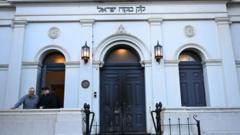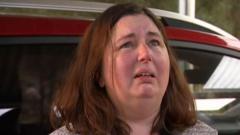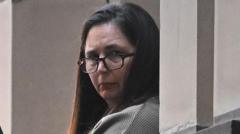Australian Prime Minister Anthony Albanese has vowed to utilize the "full force of law" in response to an arson attack on a synagogue that endangered the lives of 20 dinner guests, amidst rising antisemitic incidents in the country.
Australia's PM Pledges Strong Action Against Recent Synagogue Arson Incident

Australia's PM Pledges Strong Action Against Recent Synagogue Arson Incident
The prime minister promises to address a surge in antisemitic violence following a recent attack on a Melbourne synagogue.
In an alarming episode on Friday night, a man allegedly doused the front door of a Melbourne synagogue with flammable liquid before igniting it, while around 20 individuals were enjoying a dinner inside. Fortunately, all were safely evacuated without injuries. Authorities are now investigating whether this act is connected to a disrupted attack on a Jewish-owned restaurant occurring the same evening, where protesters confronted followers of the Israel Defense Forces.
This surge in violence comes on the heels of heightened tensions following the recent Israel-Hamas conflict, which has sparked numerous antisemitic attacks across Australia. In light of these developments, the Australian government appointed a special envoy to combat antisemitism and enacted more stringent laws addressing hate crimes.
Prime Minister Albanese emphasized, "Antisemitism has no place in Australia," expressing his commitment to ensuring that those responsible for these distressing incidents are swiftly brought to justice. He confirmed that the government would allocate necessary resources to support these efforts.
Alex Ryvchin, the co-chief executive of the Executive Council of Australian Jewry, voiced serious concerns about the increasing frequency of these antisemitic attacks, indicating that it represents a "severe escalation" against the community. Israel's Foreign Minister, Gideon Saar, remarked that the Australian government needs to intensify its fight against this "toxic disease."
As the fallout from the ongoing Middle Eastern conflict continues to affect Australian politics, it has led to contrasting protests from both Jewish and Muslim communities, exacerbating issues such as Islamophobia and antisemitism. The recent violence has sparked widespread condemnation and calls for greater action to foster community safety and mutual respect.
With an estimated death toll of over 57,000 in Gaza since October's violence began, the conflict's reverberations are felt far beyond the region, influencing Australia’s social climate and political discourse.
This surge in violence comes on the heels of heightened tensions following the recent Israel-Hamas conflict, which has sparked numerous antisemitic attacks across Australia. In light of these developments, the Australian government appointed a special envoy to combat antisemitism and enacted more stringent laws addressing hate crimes.
Prime Minister Albanese emphasized, "Antisemitism has no place in Australia," expressing his commitment to ensuring that those responsible for these distressing incidents are swiftly brought to justice. He confirmed that the government would allocate necessary resources to support these efforts.
Alex Ryvchin, the co-chief executive of the Executive Council of Australian Jewry, voiced serious concerns about the increasing frequency of these antisemitic attacks, indicating that it represents a "severe escalation" against the community. Israel's Foreign Minister, Gideon Saar, remarked that the Australian government needs to intensify its fight against this "toxic disease."
As the fallout from the ongoing Middle Eastern conflict continues to affect Australian politics, it has led to contrasting protests from both Jewish and Muslim communities, exacerbating issues such as Islamophobia and antisemitism. The recent violence has sparked widespread condemnation and calls for greater action to foster community safety and mutual respect.
With an estimated death toll of over 57,000 in Gaza since October's violence began, the conflict's reverberations are felt far beyond the region, influencing Australia’s social climate and political discourse.



















